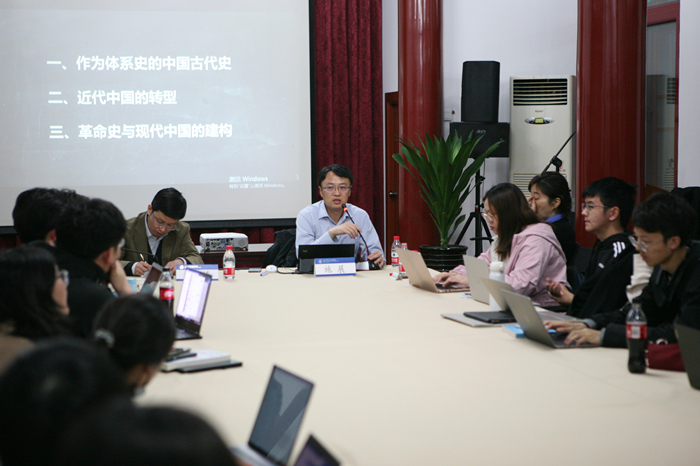
On the evening of April 9, 2021, the Institute of International and Strategic Studies (IISS), Peking University (PKU) held the 49th session of "North Pavilion Dialogue" lecture series. Shi Zhan, Professor at China Foreign Affairs University (CFAU) and Director of the World Politics Center, CFAU, gave a seminar titled "What Is China?". The seminar was hosted by Gui Yongtao, Vice President of the IISS and Vice President of the School of International Studies (SIS), PKU.
Prof. Shi Zhan began by looking at the problems China encounters in domestic and foreign affairs today, pointing out that the policy predicaments may stem from the ambiguity in historical narratives, and arguing that a new view of history is needed to promote national identity, so as to effectively define China's national interests and strategic goals and find a breakthrough for policy issues from the underlying logic.
Focusing on the "meta-narrative of Chinese history", Prof. Shi summarized three major predicaments in traditional Chinese historical narratives. First, the lack of attention to and discussion of ethnic minorities in the narrative of ancient Central Plains history has led to a lack of national identity and sharing of historical views. Second, the humiliation narrative in the narrative of modern Chinese history has created nationalist sentiments that tend to worsen China's diplomatic environment. Third, the focus on right and wrong in the narrative of Chinese revolutionary history has repeatedly led to a dispute over positions in domestic discussions, making it difficult to reach a consensus.
Prof. Shi then proposed three new historical views for the three predicaments respectively and integrated them into a consistent and unified interpretive framework to break through the predicaments of traditional historical narratives. First, he argued that ancient Chinese history should be understood as a systematic history, and that ethnic minorities should be included in the historical narratives of ancient China. By citing historical facts from the Qin and Han dynasties, he pointed out that although the geographical dependence of Confucian culture led to different political logic between the Central Plains regime and the grassland regime, the culture eventually formed a historical system that was mutually constructive and symbiotic, pluralist, and internally balanced. Second, for modern Chinese history, he believed that joining the world economic system is an inherent need of Chinese history. The internal equilibrium reached by the ancient historical system not only brought peace dividend, but also led to overpopulation and the predicament of involution. He analyzed that the arrival of the West in the modern era drove China's transformation from a closed economy to a global economy, which helped transform the predicament of involution caused by overpopulation into a competitive advantage for the country. Third, he further proposed that competitive advantage needs to be premised on political integration, and thus from the perspective of revolutionary history, revolution is a means of political integration. Only by completing self-integration can a state join the global system and unleash its competitive advantages.
Finally, Prof. Shi concluded that the reconstruction of historical view is also the change of narrative logic. The in-depth exploration and analysis of China's problems can help further understand and deal with the relationship between China and the world.
During the Q&A session, Prof. Shi had exchanges and discussions with the teachers and students present at the seminar on issues such as the applicability and methodology of reconstructing the historical view of China, the relationship between the mobilization of Confucian culture and the mode of production, the practical significance of reconstructing historical view, and the comparison between ancient imperial regime and Hobbesian Leviathan. (Contributed by Bao Xiaodong)
Editor: Li Fangqi photographer: Zheng Peijie

